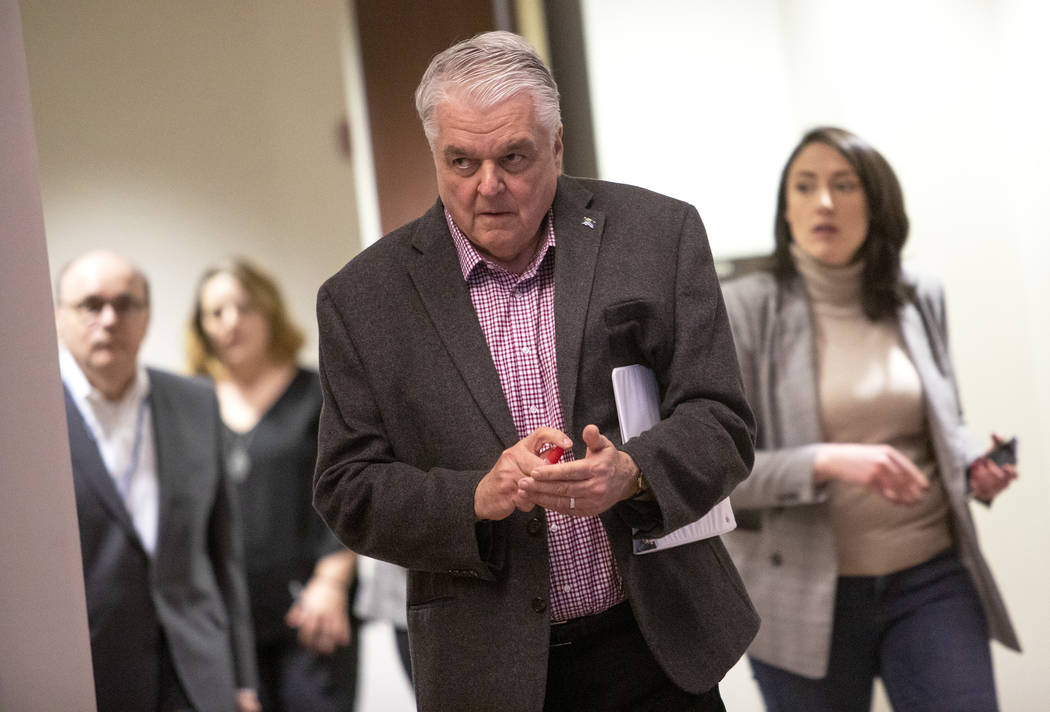Sisolak unveils steps to limit size of public gatherings in Nevada — VIDEO

Following the decision Sunday to close all of Nevada’s K-12 schools through mid-April, Gov. Steve Sisolak announced a number of additional measures and recommendations aimed at helping residents, governments and businesses respond to and potentially contain the spread of COVID-19.
The governor said he would close most state offices and asked businesses to allow employees to work from home, churches to postpone services, casinos to limit seating at gaming tables and local governments to reduce the size of public gatherings, all in an effort to contain the coronavirus that has infected 26 Nevadans.
“No matter how much we hope that this goes away, if we wait one more day to take action it will not go away,” the governor said, citing “a lot of unknowns right now.”
Nevada has not received enough COVID-19 test kits to meet demand, and as a result “we don’t know the full extent of what we’re dealing with,” he said. “But based on the rapid spread of virus around the world and what we’ve already seen in Nevada, we know that we must act quickly, very quickly.”
Later, invoking the Oct. 1, 2017, tragedy, the governor said Nevada’s citizens showed the nation then “what it means to stand together.”
“I’m asking my fellow Nevadans to do it with more commitment, and more compassion, than ever before,” the governor said with emotion. “We know what this will mean for our communities. We will undoubtedly face hardships. There will be a loss of income. Families and individuals will be inconvenienced. I ask every Nevadan to call your neighbors, call, check on the elderly who may be alone and may be in need.”
The governor said he had ordered the expansion of paid administrative leave for state employees under the current emergency and directed state offices to close to the public as soon as possible. For essential services like unemployment processing, motor vehicles, Medicaid and welfare, he directed agency leaders to wind down in-person public services and move to online or over-the-phone processing. He said he would allow agency heads to decide “what works best for their offices and employees.”
“We must protect the health and safety of the public and our state workforce, while ensuring that the important work of our state government does not grind to a halt,” he said. “These are unprecedented circumstances that call for creative solutions.”
The governor said the state would initiate a hiring freeze and ask agencies to limit spending to essential emergency purchases.
County, cities declare emergencies
Clark County and a handful of Southern Nevada cities declared emergencies on Sunday night amid growing coronavirus concerns, according to a statement from the county.
Las Vegas, Henderson, North Las Vegas, Mesquite and Boulder City joined the county in declaring emergencies “to better manage the coronavirus situation and its associated impacts to hospital emergency rooms, local government agencies, local businesses, residents and visitors,” the statement said.
The decision came after Sisolak declared a state of emergency in Nevada on Thursday and President Donald Trump declared a national emergency on Friday.
The declaration will provide assistance for the local governments as they manage response and recovery efforts, according to the statement.
“The current situation involving the coronavirus requires some administrative leniency in the enforcement of ordinances, rules, regulations, purchasing and other government functions,” the statement said.
Kids ‘will not go hungry’
Regarding the statewide school closings he announced earlier, the governor said students who rely on free or subsidized meals from their schools will continue to receive them and that children “will not go hungry” while schools are closed. But in a message to students, he said the closures were “not an extended spring break.”
“This needs to be taken seriously. You need to take this seriously,” he said. “I know many of you have heard that young people are at low risk, but you can still be exposed to their virus and pass it on to others.”
As for the public at large, he asked those who can work from home to do so, and for businesses to put in place social distancing practices to protect their employees’ health. Ill employees “must absolutely stay home from work,” he said, and people with underlying health conditions and other high-risk populations “should stay at home in avoid unnecessary contact with others.”
He asked houses of worship to consider postponing services if they could not practice social distancing, and asked local governments to hold attendance at public gatherings to half of venue capacity.
Asked about potential strains on unemployment benefits as businesses close, the governor said the state has a “healthy unemployment fund right now.”
As for gaming establishments, the governor said he would “strongly support any decision our properties make on the difficult decision whether or not to close” but said properties that remain open would have to comply with new restrictions.
Those restrictions include no more than three chairs at table games, gaming machines must be cleaned and sanitized at least every two hours, and open buffets must be served by employees, not left to patrons to serve themselves. Gaming floors also should comply with social distancing guidelines.
The governor said the state would also work with local chambers of commerce and regional development authorities and organize efforts to help small businesses with loan assistance. He said he would also consult with legislative leaders “to begin to address the financial implications of this crisis.”
“We are confident that as Nevada always has we will bounce back from these challenges and become even stronger demonstrating our frontier and pioneer spirit,” he said. “We are all in this together, and let’s do whatever we can to be part of the solution, and to share responsibility for each other as Nevadans.”
Contact Capital Bureau reporter Bill Dentzer at bdentzer@reviewjournal.com. Follow @DentzerNews on Twitter. Review-Journal staff writer Alexis Egeland contributed to this report.